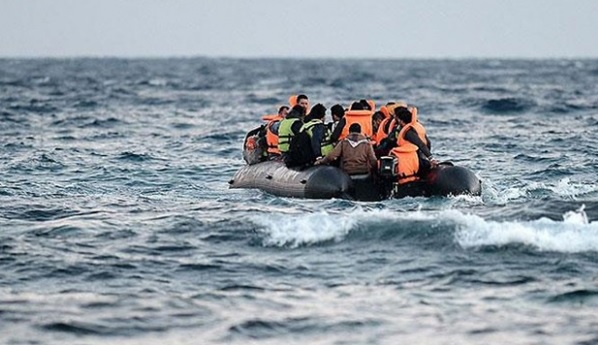
A boat carrying dozens of migrants bound for Europe capsized in the Mediterranean Sea off Libya and at least 45 people drowned or were missing and presumed dead, the U.N. said Wednesday.
The capsizing, which marked the largest number of fatalities in a single shipwreck off the coast of the North African country this year, happened Monday when the engine exploded, U.N. officials said. The boat, carrying at least 82 migrants, then capsized.
Thirty-seven survivors, mainly from Senegal, Mali, Chad and Ghana, were rescued by local fishermen and later detained by Libyan officials onshore, according to a joint statement by the International Organization for Migration and the U.N. refugee agency.The International Organization for Migration (IOM), and UNHCR, the UN Refugee Agency, are deeply saddened by the tragic death of at least 45 migrants and refugees on 17 August, in the largest recorded shipwreck off the Libyan coast this year.
Some 37 survivors – mainly from Senegal, Mali, Chad and Ghana – were rescued by local fishermen and later detained upon disembarkation. They reported to IOM staff that 45 others including five children lost their lives when the vessel’s engine exploded off the coast of Zwara.
The two organizations are calling for a review of States’ approach to the situation after this latest tragic incident in the Mediterranean. There is an urgent need to strengthen the current search and rescue capacity to respond to distress calls.
There remains a continued absence of any dedicated, EU-led search and rescue programme. We fear that without an urgent increase in search and rescue capacity, is a risk of another disaster similar to incidents that saw large loss of life on the Central Mediterranean prior to the launch of Mare Nostrum.
NGO vessels have played a crucial role in saving lives at sea amid a sharp reduction in European state-led efforts. The humanitarian imperative of saving lives should not be impeded and legal and logistical restrictions on their work must quickly be lifted.
UNHCR and IOM are deeply concerned by recent delays in rescue and disembarkation. We urge states to swiftly respond to these incidents and systematically provide a predictable port of safety to people rescued at sea. Delays recorded in recent months, and failure to assist, are unacceptable and put lives at avoidable risk. Where commercial vessels are the nearest boat capable of carrying out a rescue, they should be promptly provided with a safe port for disembarking the rescued passengers. They should not be instructed to return people to Libya, where they are at risk of the ongoing conflict, severe human rights violations, and arbitrary detention post-disembarkation.
Responsibility for carrying out rescues is increasingly being taken by the Libyan State vessels, which has led to more than 7,000 people being returned to Libya so far in 2020. Any assistance and responsibilities assigned to Libyan search and rescue entities should be made conditional on no one being arbitrarily detained, ill-treated or subjected to human rights violations post-disembarkation. Without such guarantees, support should be reconsidered, and search and rescue responsibilities redefined.
At least 302 migrants and refugees perished on this route so far this year. According to IOM’s Missing Migrants Project and UNHCR, the current estimated number of fatalities is likely much higher.
IOM and UNHCR recognize the continued challenges presented by sea arrivals and welcome the efforts of Mediterranean coastal States to continue receiving rescued refugees and migrants. In the context of the COVID-19 pandemic, two thirds of European countries have found ways to manage their borders effectively while allowing access to their territories for people seeking asylum. Medical screenings at borders, health certification or temporary quarantine upon arrival are some of the measures put in place by a number of European and other countries. The pandemic should not be used as an excuse to deny people access to all forms of international protection.
Over 17,000 people have arrived in Italy and Malta this year by boat from Libya and Tunisia, a threefold increase compared to 2019. However, the number has drastically decreased compared to years prior to 2019 and is manageable with political will and EU solidarity with European coastal States. We reiterate the urgent need to move beyond ad hoc arrangements to a swifter, more predictable disembarkation mechanism.
The instability and lack of security in Libya enables smugglers, traffickers, and criminals in general to act with impunity as they prey on vulnerable migrants and refugees.
UNHCR and IOM call on Libyan authorities to take firm steps against smugglers and traffickers. This should include disrupting and ending smuggling rings led by criminal groups to prevent further exploitation and abuse. The international community should assist these efforts and provide more support to the authorities in their fight against human trafficking networks.
Libya, which descended into chaos following the 2011 uprising that toppled and killed longtime dictator Moammar Gadhafi, has emerged as a major transit point for African and Arab migrants fleeing war and poverty to Europe.
Most migrants make the perilous journey in ill-equipped and unsafe rubber boats. The IOM said in March that its estimated death toll among migrants who tried to cross the Mediterranean passed the “grim milestone” of 20,000 deaths since 2014.
More than 7,000 migrants were intercepted by Libya’s coast guard and returned to Libya so far this year, and at least 302 migrants and refugees have perished since the beginning of 2020, according the two U.N. agencies.
In recent years, the European Union has partnered with the coast guard and other Libyan forces to stop the flow of migrants.
Rights groups say those efforts have left migrants at the mercy of brutal armed groups or confined in squalid and overcrowded detention centers that lack adequate food and water.
The EU agreed earlier this year to end an anti-migrant smuggler operation involving only surveillance aircraft and instead deploy military ships to concentrate on upholding a widely flouted U.N. arms embargo that’s considered key to winding down Libya’s relentless war.







